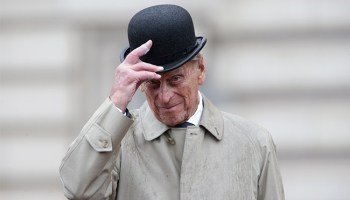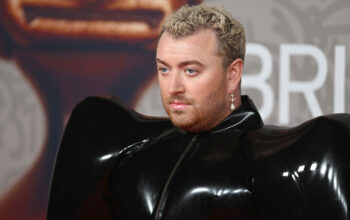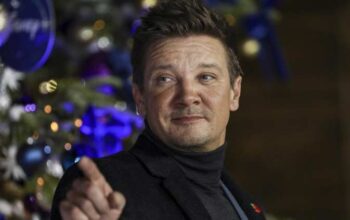The British-Aussie fundraiser and DJ who called Prince Philip ‘dude’
After the bathroom as big as her apartment and the biscuits with the little crowns on them, it was Prince Philip’s eyes that struck Erica Myers-Davis on her first visit to Buckingham Palace.
The Duke of Edinburgh “bounced” into the room, every bit the sportsman he was, and “never moved like an old person” despite being already in his mid-80s.
“(It) was just his blue eyes, you know,” she tells Nine.com.au.

“He just has the most incredible blue eyes that twinkled.
“So you sort of, kind of (thought) ‘are you being serious, are you joking?'”
Born in the English Midlands to Jamaican parents, before living half her life in Australia, the fundraiser, author, board member and even DJ walked a long path to the palace
That meeting, and many more like it from 2008 to 2017, came through Dr Myers-Davis’s role with the Royal Commonwealth Ex-Services League, which she likes to think of as the prince’s “favourite” of the hundreds of charities he supported.
Her lasting impression is of the “down to earth” way he would approach people, bursting into the room without ceremony, popping up from nowhere at her elbow to ask how she was and remembering minor details, months down the track.
There’s the way Philip encouraged her to write a book detailing the unsung roles people of colour played in helping to win World War II, and convinced Prince Harry to write a foreword.

And her fondest memory, a party with English bubbly and fish and chips to celebrate the league’s 90th anniversary, the same year the duke turned 90 himself, a coincidence she says he would often chuckle about.
He could be informal in a way the self-described “true Commonwealth citizen” had never expected of a royal. Not “aloof” but “very much himself”, just like she imagines he would act at home.
Dr Myers-Davis admits she might have taken the informality a bit far on at least one occasion but “HRH”, as she repeatedly refers to him, “didn’t seem to mind”.
“I’d spent 10 years in Australia, and I was very Aussie, you know, more Aussie than I realised, right?” she said.
“So I’d swear a lot, you know, with an Aussie accent and was very informal, because that’s how Aussies are.
“And coming back to the UK, it’s quite formal, so when we’d have these meetings, apparently I would forget to say things like ‘Your Highness’ and ‘Sir’.
“And I would get told afterwards: ‘Erica, you know, you called him ‘dude’ three times?”

A lasting legacy
Then on Friday, while on a Greek island not too far from the Prince’s hometown of Corfu, came the tears when she heard about his passing.
“I think a lot of people are probably very surprised at how deep his legacy is,” the RCEL council member for Jamaica says.
“Because I think, you know, often the media sort of focused on the sort of the gaffes and the, you know, whatever, which I have to say personally, I never sort of came across …
“I mean, he’s so well-loved and respected, by veterans, by military, and, I think, around the Commonwealth.
“And he just did so much.”
On how a man who lived a life of such privilege, so remote from most of his Commonwealth subjects, still managed to capture the imagination of people as far afield as Jamaica and Australia, Dr Myers-Davis says his “birth story” is more relatable than might be thought.
“Yes, he was born into a royal family, but his dad was threatened with death and they had to be rescued, sort of exiled,” she says.
“And he had parents that were sort of a bit absent and he was sort of shuffled off between different people.
“I know, for me, personally, I mean, one thing we had in common was that we both went to boarding school about the age of seven and I kind of relate to some of that family sort of displacement.”
Many of the moments choreographed by The Duke demonstrate his lifelong commitment to the Armed Forces.
His Royal Highness’s coffin will be carried by both the Grenadier Guards and the Royal Marines during tomorrow’s ceremony. pic.twitter.com/xAUl28sMs3
— The Royal Family (@RoyalFamily) April 16, 2021
‘He just loved it’
After joining the Royal Navy in 1938, aged 18, the prince took part in the battle of Crete and the Allied invasion of Sicily and was on duty when the Japanese surrendered on September 2, 1945, before famously giving up his career for Queen Elizabeth II.
On Saturday, the duke’s coffin will be flanked by representatives from the Royal Navy, the Royal Marines, the Highlanders, and 4th Battalion Royal Regiment of Scotland and the Royal Air Force.
Dr Myers-Davis, though a civilian, thinks his years of service played a big role in his connection to other veterans and the work of the RCEL itself.
“He loved it, you know, like, he just loved it,” she said.
“I mean, he led us for 41 years, took over from Lord Mountbatten.
“He would be at every meeting. I don’t think he ever missed a meeting, to be honest. He certainly never missed a conference.”
The RCEL supports veterans in Commonwealth countries, including Australia and Jamaica, who served the Crown directly, as opposed to their own country’s armed forces.
The league generally provides cash support for those who slip through the cracks of military pension eligibility in both the UK and their home country, including a few hundred Australians who served in the British Armed Forces, Dr Myers-Davis says.
‘He made everyone feel comfortable’
Prince Philip’s legacy, one of steadfast support for his wife and service to the Crown as the longest-serving royal consort in British history, has been complicated by a history of offensive and at-times racist remarks.
While many hailed his quick wit and ability to entertain a group of people or lighten the mood at any gathering, others criticised his comments as racist, sexist, or behind the times.
For Dr Myers-Davis, her experience was firmly of the entertaining; he was welcoming Prince Philip, always trying to find a way to make visitors feel at home in what may have been a fairly intimidating situation for some.
“I never felt anything but comfortable with him and he made everyone feel comfortable,” she said.
“And bearing in mind, the room was full of people from all across the Commonwealth.
“So every shade and colour was represented in that room and he was comfortable with everybody.”








